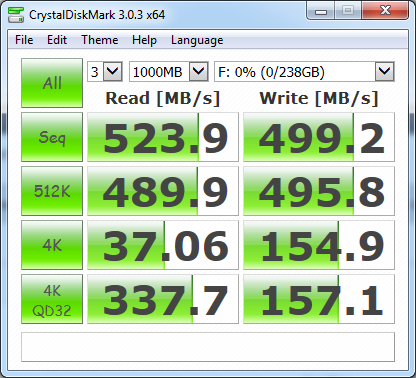CRYSTAL DISK BENCHMARK VER. 3.0 X64
Crystal Disk Benchmark is used to measure read and write performance through sampling of random data which is, for the most part, incompressible. Performance is virtually identical, regardless of data sample so we have included only that using random data samples.
In Crystal Disk Mark the M.2 M600 achieved 524MB/s read and 499MB/s write. The drive’s 4K reads come in at 37.06MB/s and 154.9MB/s for the 4K writes.
The toughest benchmark available for solid state drives is AS SSD as it relies solely on incompressible data samples when testing performance. For the most part, AS SSD tests can be considered the ‘worst case scenario’ in obtaining data transfer speeds and many enthusiasts like AS SSD for their needs. Transfer speeds are displayed on the left with IOPS results on the right.
In AS SSD it reaches an overall score of 1192, just 2 points off from what the 256GB 2.5″ 7mm drive reached. Sequential speeds hit 523.35MB/s for reads and 477.21MB/s write. 4K speeds reach near 34MB/s for read and 133.49MB/s for write. Furthermore, the drive reached 94,687 read IOPS and 79,946 write IOPS at queue depth 64.
To complement this, the AS SSD Copy Bench presents us with transfer speeds for different file types. The M.2 M600 reached a high of 474.91MB/s for the ISO test.
ANVIL STORAGE UTILITIES PROFESSIONAL
Anvil’s Storage Utilities (ASU) are the most complete test bed available for the solid state drive today. The benchmark displays test results for, not only throughput but also, IOPS and Disk Access Times. Not only does it have a preset SSD benchmark, but also, it has included such things as endurance testing and threaded I/O read, write and mixed tests, all of which are very simple to understand and use in our benchmark testing.
In Anvil Storage Utilities the max sequential read reaches 520.99MB/s and max sequential write is just shy of the rates specification, coming in at 475.62MB/s. When looking at 4K speeds, it was able to reach similar results to those shown in AS SSD, 35.44MB/s for read and 129.62MB/s for write.
 The SSD Review The Worlds Dedicated SSD Education and Review Resource |
The SSD Review The Worlds Dedicated SSD Education and Review Resource | 


Too bad, they didn’t went with something pci-e based…
who knows … maybe if you say it LOUDER, they will give it to you 🙂